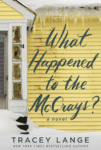The Girl He Used to Know by Tracey Garvis Graves – 291 pages
ARC courtesy of NetGalley and St. Martins Press for an honest review.
Book Blurb:
“Annika” (rhymes with Monica) Rose is an English major at the University of Illinois. Anxious in social situations where she finds most people’s behavior confusing, she’d rather be surrounded by the order and discipline of books or the quiet solitude of playing chess.
Jonathan Hoffman joined the chess club and lost his first game–and his heart–to the shy and awkward, yet brilliant and beautiful Annika. He admires her ability to be true to herself, quirks and all, and accepts the challenges involved in pursuing a relationship with her. Jonathan and Annika bring out the best in each other, finding the confidence and courage within themselves to plan a future together. What follows is a tumultuous yet tender love affair that withstands everything except the unforeseen tragedy that forces them apart, shattering their connection and leaving them to navigate their lives alone.
My Review: 4.5 stars – Guest Review
The Girl He Used to Know is a charming, heartwarming, romantic, and unique love story that captured my heart from the first page. The story is told through two timelines, switching seamlessly between 1991, when the couple meets in college, and 2001, when their paths cross again. The story alternates between Annika’s and Jonathan’s points of view, and both of the timelines and voices are easy to follow. Both characters were well-developed, extremely likable, and their perspectives were equally compelling.
Without giving away any spoilers, Annika has the characteristics of someone on the Autism spectrum. The author’s portrayal of Annika is spot on. (I work in the field of special education with students who are on the spectrum, and the author’s portrayal of Annika is realistic). The author must have had familiarity with an adult on the spectrum in order to depict such an authentic characterization of Annika. There is not a false note in the entire book. With sensitivity and compassion, Ms. Graves gives the reader insight into the mind of an adult on the autism spectrum that surpasses any book I have read dealing with a similar topic. Unlike characters on the autism spectrum who are depicted simplistically in many novels, Annika is a fully realized character. The author realistically portrays Annika’s challenges which include: difficulty interpreting social norms and the behavior of others, craving of order and discipline, social awkwardness, anxiety, bullying and trying to fit in.
Throughout the book, the author shows the reader how Annika’s “differences” are actually her “strengths”. An added bonus is that this book is set in Illinois. Annika and Jonathan attend college at the University of Illinois, Champaign, and ten years later they reunite in Chicago. The reader also learns about the inner workings of collegiate chess tournaments.
Overall, this is a tender, powerful, uplifting love story that will warm your heart. The characters are multidimensional and you be invested in them, root for them, grow to love them, and admire them for their courage, ability to change, fight for each other, and to help each other heal. I am still thinking about this book weeks after I finished it. I didn’t want this book to end, and am hoping that Ms. Graves will write a sequel. Review by Guest Fairy Ronna.
Quotes I liked:
I never know what people are thinking. It’s like visiting a country where you don’t speak the language and you’re trying so hard to understand but no matter how many times you ask for juice, they keep bringing you milk.”
“Marched to the beat of a different drum, did she? She marched to the beat of an entirely different band. One you’ve never heard of and under no circumstances ever expected to like.”
“All my life, I’d been waiting for someone I could be myself with. It had never occurred to me that I could be that person for someone else.”
“I try so hard to fit in. I spend hours studying behaviors…”It’s like everyone around you has a copy of the script of life, but no one gave it to you so you have to go in blind and hope you can muddle your way through. And you’ll be wrong most of the time.”
“Concentrating on the game eliminated a lot of the anxious clutter that constantly took up real estate inside my brain.”


















